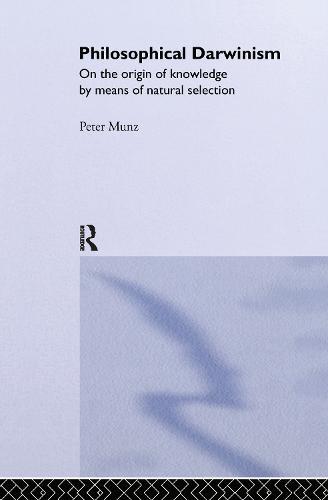Overview
Philosophers have not taken the evolution of human beings seriously enough. If they did, argues Peter Munz, many long standing philosophical problems would be resolved. One of philosophical concequences of biology is that all the knowledge produced in evolution is a priori , i.e., established hypothetically by chance mutation and selective retention, not by observation and intelligent induction. For organisms as embodied theories, selection is natural and for theories as disembodied organisms, it is artificial. Following Popper, the growth of knowledge is seen to be continuous from the amoeba to Einstein'. Philosophical Darwinism throws a whole new light on many contemporary debates. It has damaging implications for cognitive science and artificial intelligence, and questions attempts from within biology to reduce mental events to neural processes. More importantly, it provides a rational postmodern alternative to what the author argues are the unreasonable postmodern fashions of Kuhn, Lyotard and Rorty.
Full Product Details
Author: Peter Munz
Publisher: Taylor & Francis Ltd
Imprint: Routledge
Dimensions:
Width: 15.60cm
, Height: 1.70cm
, Length: 23.40cm
Weight: 0.498kg
ISBN: 9780415086028
ISBN 10: 0415086027
Pages: 262
Publication Date: 18 March 1993
Audience:
College/higher education
,
General/trade
,
Tertiary & Higher Education
,
General
Format: Hardback
Publisher's Status: Active
Availability: In Print

This item will be ordered in for you from one of our suppliers. Upon receipt, we will promptly dispatch it out to you. For in store availability, please contact us.
Reviews
Peter Munz is a genuinely interdisciplinary thinker, bridging history, philosophy, biology and more. As such, he manages to irritate staid practitioners in many fields. He manages also to combine separate insights into a unified attack on the fundamental problems of knowledge. I am not sure that he is right. I am sure that he should be heard. Critic and friend alike will come away wiser. -Michael Ruse, University of Guelph Original and thought-provoking . . . it is well-written but not over-technical, and the subject matter will be of interest to people interested in the topics of evolution and consciousness in themselves, as well as to philosophers. -Anthony O'Hear, University of Bradford
Peter Munz is a genuinely interdisciplinary thinker, bridging history, philosophy, biology and more. As such, he manages to irritate staid practitioners in many fields. He manages also to combine separate insights into a unified attack on the fundamental problems of knowledge. I am not sure that he is right. I am sure that he should be heard. Critic and friend alike will come away wiser. <br>-Michael Ruse, University of Guelph <br> Original and thought-provoking . . . it is well-written but not over-technical, and the subject matter will be of interest to people interested in the topics of evolution and consciousness in themselves, as well as to philosophers. <br>-Anthony O'Hear, University of Bradford <br>



